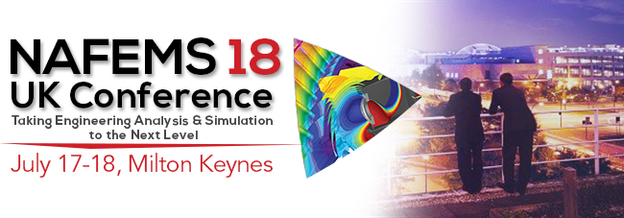Academic Symposium
Big Education / Simulation Issues
Education is at the heart of NAFEMS and this symposium will address the issues facing individuals and organisations engaged in education and training, in support of the effective use of analysis and simulation technologies.
Agenda
Keynote Presentation: Big Simulation – Future Issues
Professor Jim Boyle, Mechanical & Aerospace Engineering - University of Strathclyde, Glasgow
Equilibrium Finite Elements in the Education of Engineers
Angus Ramsay, Ramsay Maunder Associates Limited
Simulation Education: Recognising Evolving Industry Requirements and Individual Needs when Dealing with Large Class Sizes
Declan Nolan, Queen's University Belfast
Virtual Engineers of the Future: Recognising and Nurturing Talent in Undergraduate Degree Programmes
Lee Margetts, Manchester University
Attracting and Retaining Women in Engineering Simulation
Althea de Souza, Quesada Solutions Ltd.
Current & Perceived Future Challenges in Engineering Simulation Education Discussion Session
Jim Wood, JW Analysis Ltd.
How Can NAFEMS Provide Better Support to Academics & Students in Engineering Simulation? Discussion Session
Jim Wood, JW Analysis Ltd.
The objective of the event is to hold informed breakout sessions to explore some of the key issues involved in the topic areas below and how NAFEMS can improve its engagement with University academic staff and students.
Symposium Themes
- Educating engineers today and tomorrow.
- Challenges and the role of analysis and simulation.
- Is education keeping up with simulation developments and potential?
- Operating in a global market … experiences of suppliers and recipients.
- How to deploy open, online learning in the delivery and assessment of courses.
- What are the barriers and pitfalls in this exciting and rapidly growing area?
- Credit transfer issues - including microdegrees and nanodegrees.
- Can engineering simulation be massive and open?
- Innovation in content and delivery.
- Dealing with large classes while recognising individual needs.
- How to provide personal timely assessment and feedback in the higher cognitive areas?
- Novel approaches to delivering effective learning with different resources.
- Examples of effective collaborative partnerships with industry.
- Course design, sandwich placements, sponsorship, employment opportunities.
- Industrially linked case studies and projects.
- Opportunities with higher and degree apprenticeships.
- Illustrations of multidisciplinary degrees in the engineering simulation area, involving engineering, biological sciences, chemistry.
- What were the drivers and how were challenges overcome?
- Student motivation and engagement.
- Influential factors and the HEA United Kingdom Engagement Survey (UKES).
- The UK Teaching Excellence Framework, National Student Surveys and League tables as possible drivers.
- Experience with flipped classes, active learning or flexible learning.
- Competition and Grand Challenge linked projects.
- The potential for new teaching methods in engineering simulation, including tele-immersion and pervasive computing technologies.
- The integration of engineering simulation into Design teaching, including CDIO, Fablabs and layered manufacture.
- Examples of effective combinations of physical test and engineering simulation in subjects, individual and group projects.
- Can V&V provide a focus for such integration?
- Noteworthy vendor or vendor-linked initiatives in supply and support for education.
- CPD (Continuing Professional Development) – the challenges.
- Employee succession planning.
- Gaps in provision?
- Work-based learning.
- Formalisation and recognition of training.
- Facilitating informal learning in the workplace.
- NAFEMS Professional Simulation Engineer (PSE).
- A flexible system for competence planning and development.
- A resource to facilitate informal learning?
- How is this deployed in your organisation?
- Desirable developments?
- SME’s – are their needs any different and are they being met?
- Ensuring a pipeline of Higher-Level STEM – needs and challenges.
- Socially just engineering education.
- The ongoing WISE challenge … why such a hard nut to crack?
- Will low-cost online education lead to a 2-tier education system?



